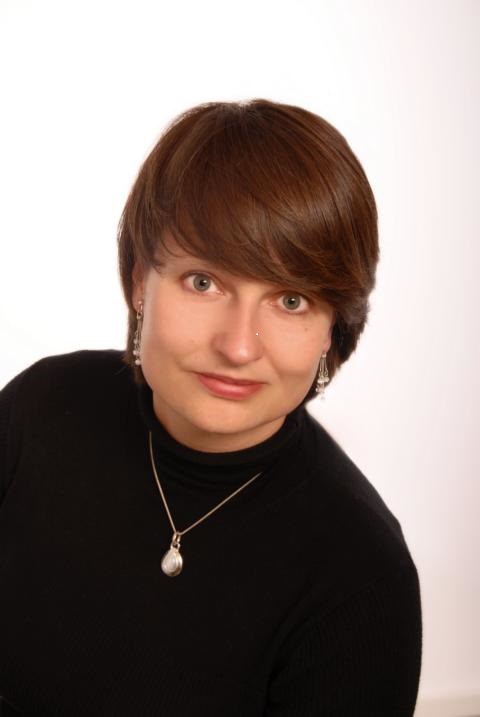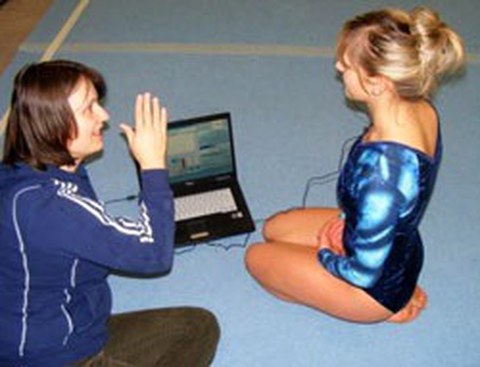Psychologist by process of elimination
(Interview from 2011)
Dagmar Möbius
Grit Reimann made the decision to study late in life. By the age of 23, she had two children, a husband, and professional experience at the post office. She chose a psychology degree "by a process of elimination." Today, the doctor of psychology is in demand across Germany, and not just as a sports psychologist.

Sports psychology is Dr. Grit Reimann's specialty.
"I knew about Freud, but I had never read anything by him." Grit Reimann is almost surprised herself at her unusual route to university. She grew up in Pirna and went straight into casual work after graduating from high school. Three months later, her first child was born. She got married and worked for the post office for a year until child number two was born – in the midst of German reunification. "For a long time, I didn't know what I wanted to be, and my decision to study came very late," she says. She attributes her choice of psychology to chance.
As the then 23-year-old was already living in Dresden at the time, she looked into what she could study at TU Dresden. "Then I crossed out what I didn't want to do in the course catalog." Psychology and social pedagogy were what remained. She laughs when she thinks back on it. "Until then, psychology hadn't exactly been something I had engaged with." She says she approached her degree with a certain naïveté when she started her studies in 1992. And that this was an advantage. She became determined to know everything that the science-based undergraduate program had to offer. She did not find studying difficult. Nevertheless, she acknowledges that a degree would have been almost impossible without the support of her husband and grandparents. Dr. Reimann thinks back fondly to her student days. There were only 80 students in her year. A pleasant, almost familial relationship between students and professors developed. She still reaps the benefits today of her methodological and clinical training. Although many professorships were still vacant in the 1990s, there were a number of lecturers who left their mark on Grit Reimann. Erwin Gniza, Professor of Personality Psychology, made a lasting impression on Dr. Reimann as a "psychology veteran." Professor Winfried Hacker is another figure Grit Reimann appreciates to this day as an "absolute authority on industrial and organizational psychology." Reimann wrote her final thesis under Hermann Körndle, the Professor of Educational Psychology. "He gave me free rein and encouraged me, and also introduced me to sports psychology," she says, having been an active gymnast herself until 2005. Although it was at TU Chemnitz in 2007 that Dr. Grit Reimann finished the doctoral dissertation she had started in Dresden – on the development and evaluation of interactive learning tasks in a computer-assisted learning environment – she still has ties to TUD and teaches seminars on teacher training there.
However, it was a long time before she knew what direction she wanted to take. She was interested in child and adolescent psychotherapy, but opted out of the therapeutic track after attending a graduate information session. "It's interesting," she smiles, "because now I actually do work in therapeutics with kids, albeit in sports." Following a posting as research associate at the TUD Chair of Psychology of Learning and Instruction, she set up her own private practice in 2004 – initially in Freital; since 2005, she has been in Dresden. At the German Sport University Cologne, she trained in sports psychology for competitive sports. She is a relaxation instructor accredited in various techniques, has completed further training in systemic family therapy, and is already training in another area – this time hypnotherapy.

Dr. Grit Reimann explains biofeedback processes to a gymnast at Halle's Olympic training center.
Grit Reimann's schedule is already a busy one without her latest field. Regular working days are a foreign concept, and free weekends are rare. The 41-year-old trains Pirna's next generation of gymnasts ten hours a week: "It's a hobby, a change of scene, and free time all in one for me." At Olympic training center in Halle, she regularly works with junior squads – artistic gymnasts and divers. Until three years ago, she traveled with the national diving team. She has also coached biathletes, triathletes, strength athletes, billiards and tennis players, swimmers, show jumpers, and soccer players. Dr. Reimann works with eight colleagues in the nationwide sports psychology network; she is the only member from Saxony.
Clients come to her practice in Dresden for a wide variety of reasons. Musicians to prevent stress. All types of athletes from amateur to top professional for mental training. People who want to learn relaxation techniques or to overcome a specific problem. "People don't really recommend psychologists," she says, wondering a bit about the continued influx to her practice; "many people are afraid of opening up about their own visits." Presumably, clients do in fact frequently recommend her, because Dr. Grit Reimann also gets booked for health coaching sessions in companies in places as far afield as Wolfsburg or Braunschweig.
Her heavy workload means she has to make sure she takes good care of herself. And she has learned how. She always blocks out free time in her calendar. Dr. Reimann has also teamed up with former fellow student Dr. Frank Pietzcker to set up the partnership Dresdner Arbeitspsychologen.
Even though Dr. Grit Reimann became a psychologist by chance, she tells us "everything I've done in my life has taken me a step forward – I've always gotten something out of whatever I've done."
Contact details:
Dr. rer. nat. Grit Reimann
Praxis für Angewandte Psychologie
und Mentales Training
Heinrichstraße 8
01097 Dresden
Tel.: +49 351 64 64 25 60 or
+49 351 64 63 946
Email: Grit Reimann
Web: Psychologie Reimann
